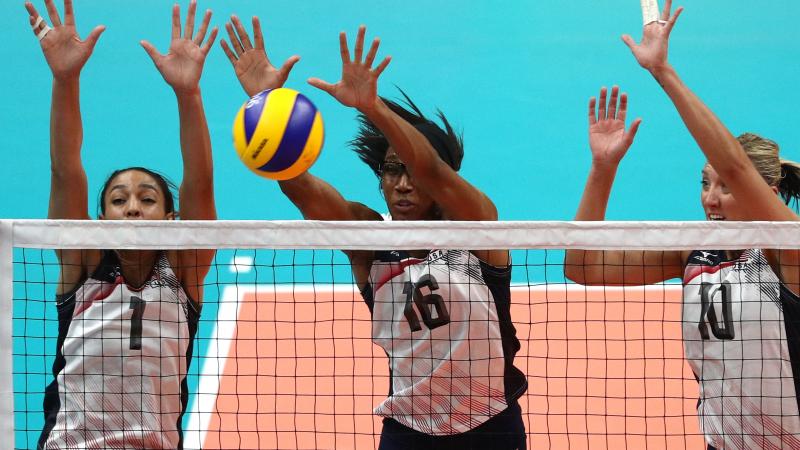2016 Olympics: Former Stanford star Foluke Akinradewo leads Team USA volleyball in Rio

RIO DE JANEIRO -- It’s the spring of 2005.
Stanford women’s volleyball coach John Dunning is in a middle school gym in Florida, about to watch a young, athletic high school senior for the first time. He’s already signed her to a letter-of-intent based on pure hype after she posted some impressive workout numbers at a USA Volleyball tryout.
Now it’s time for Dunning to watch Foluke Akinradewo play with a local boys club team.
“At that time, even though there was a Stanford male recruit in the group, Foluke was the best player in the gym,” Dunning said. “They were playing on a men's net and that was the only time I ever saw her play before she came to Stanford.”
Well, the recruit worked out.
Now playing in her second Olympics, Akinradewo has since established herself as arguably the best middle blocker in the world, and has been a major force for Team USA throughout the tournament in Rio. Not bad for a kid who was considered a raw talent with no club experience heading into college.
A photo posted by Foluke Akinradewo (@folukea) on
If you would have told high school sophomore Akinradewo that she would be starting middle blocker for Team USA at the 2016 Olympics, she wouldn’t have believed you.
“No way. No way,” Akinradewo said with a laugh. “Volleyball kind of fell into my lap. I've just been really fortunate and blessed to have been able to have the path I've had with the sport.”
Akinradewo helped lead the Cardinal to three consecutive NCAA Championships from 2006-08, and was named Pac-10 Player of the Year in 2007-08. But despite all of her success individually and with her teammates, Akinradewo had no national championship banners to show for it -- just three runner-up finishes.
[Related content: Follow the Pac-12 to Rio]
Jump to 2012, when Akinradewo and the American side looked destined for gold in London. They marched all the way to the final in impressive fashion, only to suffer a 3-1 loss to Brazil and settle for a silver medal. But Akinradewo is tired of finishing second. It’s time for a gold medal to be draped around her neck.
“It's a long time coming,” Akinradewo said. “I think I got a good taste of it with us winning the world championships back in 2014. That was the first time I had won a major event. Having that feeling and knowing what that feels like, it would be amazing to able to do it here in Rio. Not just because winning a gold medal would be awesome, but more importantly because of the group I'm getting to compete with.”
As much as the London loss hurt -- and, oh, did it hurt -- there was a silver lining in the silver medal for Team USA volleyball and Akinradewo.
“On that day -- the person who wins gold and the person who wins bronze, they won that day,” Akinradewo said. “But with silver, you lost. I'm very fortunate that that did happen. Had we won gold, I wouldn't have come back for another four years. I would have probably ended my career at that point. Just the way we went about things, and the fact we lost in that final match, kind of gave me the itch to come back.”
[Related content: Kerri Walsh Jennings, April Ross reflect on Pac-12 roots]
And now here she is, a dominant force on both sides of the net. Not only has Akinradewo been delivering big kills on a consistent basis throughout the Olympics, but she’s also been a defensive stalwart. Team USA looks poised for another deep run in the Olympics. The squad currently undefeated through three games in Rio, and will wrap up group play with a match against China on Sunday.
At the age of 28, this is likely Akinradewo’s final go on an Olympic stage. But with a pre-med degree from Stanford under her belt and a strong work ethic, Akinradewo said she will look at a career in medicine once her playing days are over. She already has a potential client waiting for her on Stanford’s campus.
“I would clearly want her to be my doctor,” Dunning said. “Not only would she know a lot and be great in that profession that she's going to choose, she also would be maybe the kindest, humanistic doctor you can imagine, that any patient would want to have be their doctor. She's going to be great at whatever she does, because she's just made of the right stuff.”


